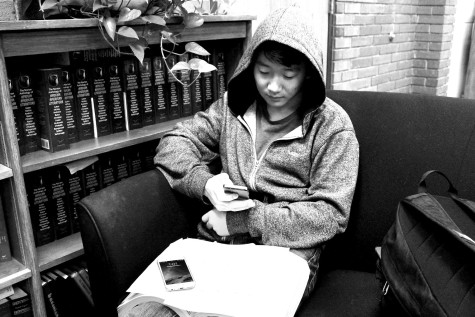Students pushed back by procrastination

The clock reads 10 p.m. On a typical night, senior Brian Kim sits at his desk, hunched over his homework. While many students are finishing their last assignments, Kim is just getting started.
“I’ve always procrastinated,” said Kim. “It’s who I am.”
According to John Perry, professor of philosophy at Stanford University, procrastination is defined as avoiding certain tasks, either by doing nothing or doing something less important.
“I’ll do anything but homework,” said Kim. “I take a long nap [after school], and then I wake up, and if I can’t focus again, I’ll go on my computer, social media, YouTube, until I can focus.”
Psychology teacher John Grimaldi said many students procrastinate because the reward for doing the work comes much later.
“If the part of your brain that thinks about long-term goals or planning isn’t fully developed, it’s hard for you to understand, ‘Well, if I do this now when I’m 16, maybe someday down the line, eight years from now, it’ll benefit me,’” said Grimaldi. “Teenagers can’t really think [in the long-term] because their brains are still developing.”
According to Perry, author of the book “The Art of Procrastination,” procrastinators can be classified into two categories.
“There are lazy procrastinators and structured procrastinators,” said Perry. “Structured procrastinators are the people who do marginally useful tasks to become motivated to do more difficult, timely and important tasks. Then there is the difference between those who make the deadlines at the last minute, and those who actually miss them.”
Though many students may find it difficult to avoid procrastination, junior Rachel Levin said there are many advantages to doing her homework right away.
“I find that when I don’t procrastinate, I can learn more, and I can get more work done, and also I enjoy what I’m learning a lot more,” Levin said.
While Levin is doing her homework, she said she tries to eliminate any distractions.
“Usually I turn my phone upside down and put it on silent so that when I get a notification I’m not distracted,” said Levin. “I typically check my phone in between assignments so that it doesn’t interrupt my train of thought.”
According to Grimaldi, students like Levin are intrinsically motivated, meaning they are able to motivate themselves.
“Part of [being motivated to do work] is that it’s in you or it’s not,” said Grimaldi. “People who don’t procrastinate frequently are motivated by the task itself.”
Although he has struggled with procrastination for his entire academic career, Kim said he has been trying to encourage himself to improve his study habits.
“Junior year, [going to sleep at] 2 a.m. was early for me, and now, senior year, I’m trying not to procrastinate, so I’ll go over to my friend’s house and study there,” said Kim. “She would actually study, so it would force me to study, too.”
According to Perry, one efficient method students can use to motivate themselves is breaking tasks into small parts and making a list, check marking each assignment they finish.
Grimaldi said students need to first experience the consequences of procrastination to prevent it later.
“I had a project in college where I had to write 30 lesson plans, and I didn’t think it was going to be that hard,” said Grimaldi. “I thought, ‘Oh, I’ve already got five of these done, and it only took me like 10 minutes to do one, so it’s not going to be that bad.’ Eventually, [time] caught up to the point where I didn’t go to bed that night to finish my project. So [my experience] was rough enough to the point where I thought, ‘I’m going to at least be realistic in my expectations [to get my work done].’”
According to Perry, even though procrastination is typically viewed negatively, there is also a positive side.
“Think of all the great works of invention, arts and literature,” said Perry. “I suspect a large proportion of them were carried out while the person was supposed to be doing something else. [Procrastination is] not the best habit in the world, but it’s not the worst.”

